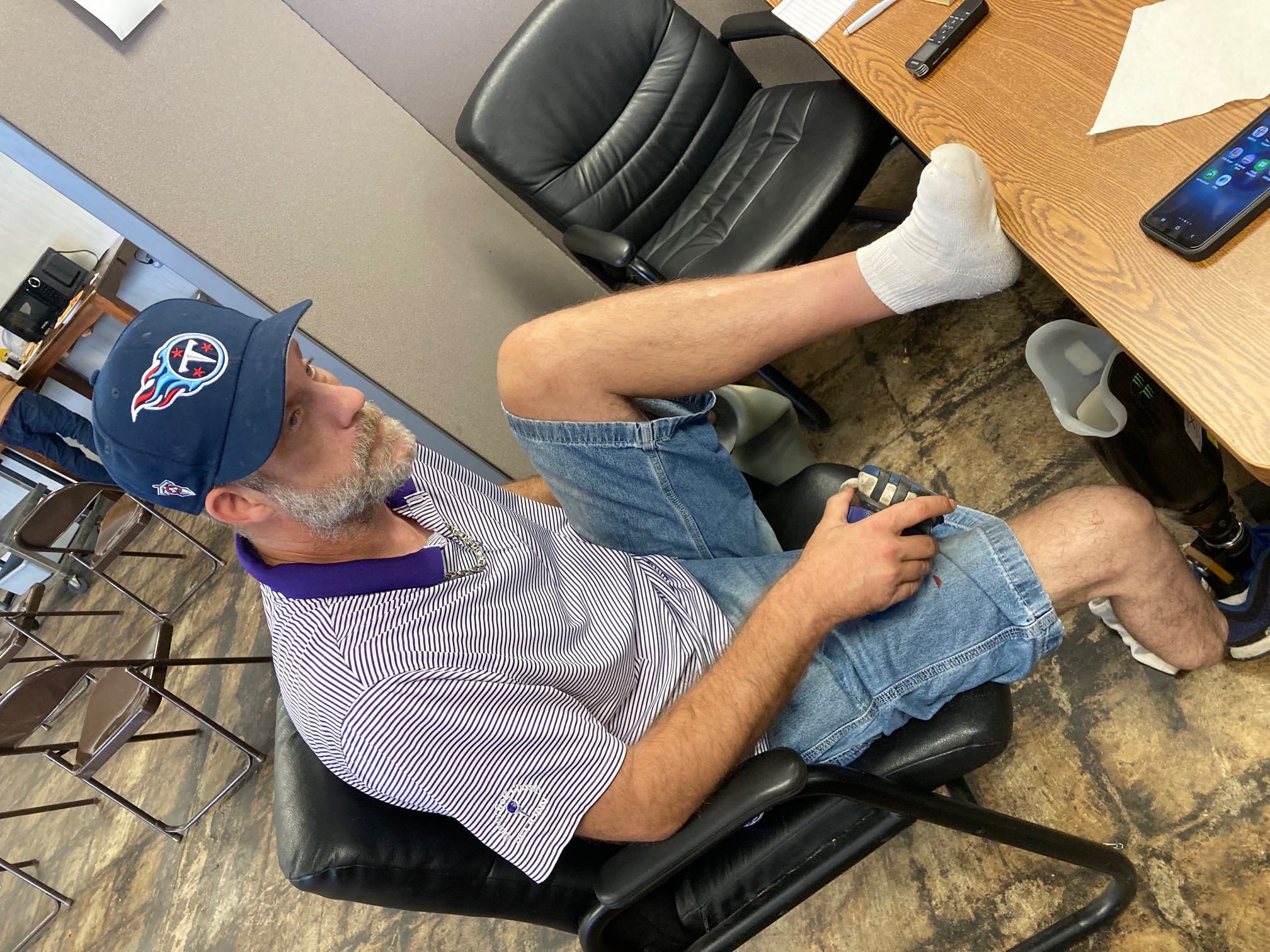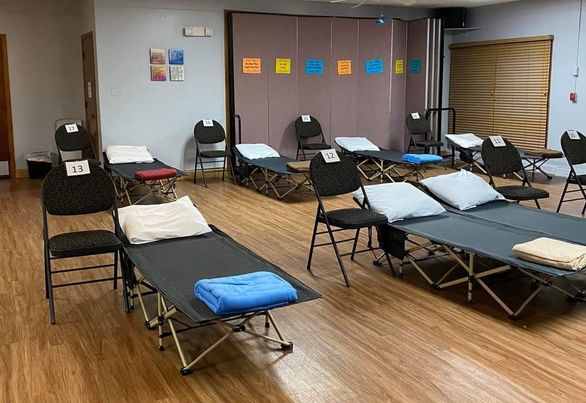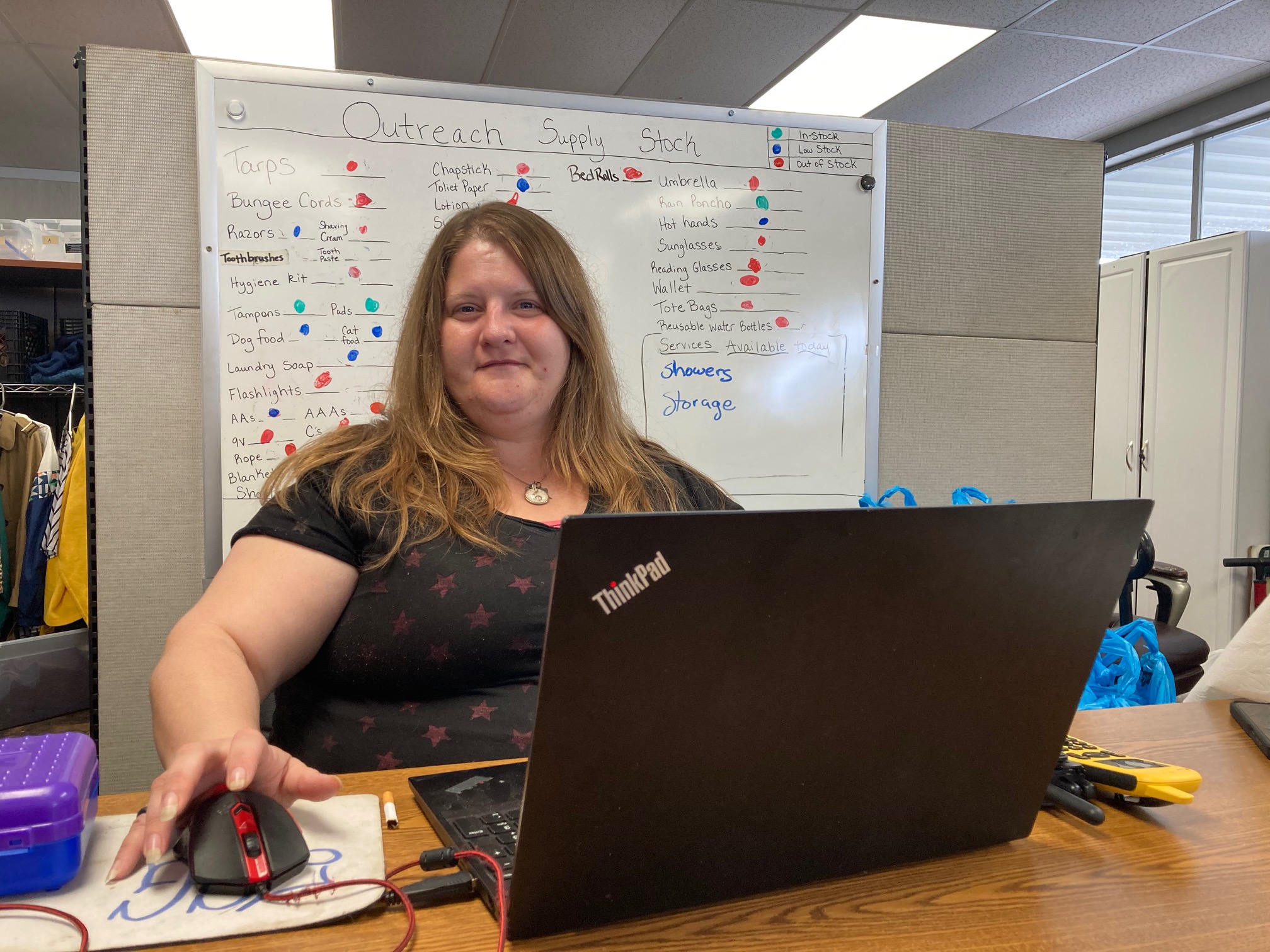Mandie Hicks had been unsheltered for years. She spent many winter nights sleeping on a cot inside a church building, thankful to be out of the cold and thankful for the volunteers who make Springfield’s Crisis Cold Weather Shelter program possible.
“You’re giving somebody a place to be off of the street, out of the weather that could harm or even potentially kill them,” Hicks said of the volunteers. “The warmth is not just physical. It’s definitely in your heart. That’s something you feel.
“They shower us with things like hot chocolate and sandwiches and all kinds of snacks,” Hicks continued. “They take care of us — make sure we’re safe in every way, so it means a lot. It means everything to someone who’s on the street.”
Hicks is in a housing program and regularly volunteers at the Connecting Grounds Outreach Center, where she can help those who still living on the streets of Springfield.
As she shared her thoughts about shelter volunteers with the Hauxeda, Christopher Ebbs sat nearby and overheard the conversation.
Evicted in winter, long walks to work

“If I had known about the cold weather shelters, I wouldn’t have got frostbite,” Ebbs said, taking off his shoes, a prosthetic foot and both socks to reveal his injuries.
Ebbs explained that he moved to Springfield when the Amazon Fulfillment Center opened in 2021. Not long after, the place Ebbs was renting sold and the new owner evicted him in the middle of the winter.
He continued working at Amazon, walking to and from work wearing steel-toed boots. Ebbs knew he was hurting, but he didn’t realize he had severe frostbite until it was too late. His right foot was amputated just above the ankle, and about half of his left foot was amputated.
Ebbs was able to stay at the Connecting Grounds medical respite home after he was released from the hospital and has since been able to get into his own place.
To give back, Ebbs volunteered at a Crisis Cold Weather Shelter last year.
“I was the guy who checked everybody in, got them their beds,” Ebbs said. “When they were done I would take the blankets and go wash them and get them ready for the next night.”
Speaking from experience, Ebbs said volunteers “give hope” to those seeking shelter.
“To let somebody sleep in a warm place, you are making a major difference in their lives,” Ebbs said. “Because when you are out there and you wake up cold, your next day is all spent just trying to get warm for the next night. It becomes a hopeless circle.”
Need for volunteers is dire
Springfield’s Crisis Cold Weather Shelter program is a network of sites that open on nights when the forecast calls for overnight temperatures to drop to 32 degrees or colder. The shelters are primarily housed in places of worship throughout Springfield and are staffed by volunteers who take turns working and sleeping.

The shelter program season begins Nov. 1, and will run through March 31.
As is often the case, the program is in desperate need of volunteers, said Emily Fessler with Community Partnership of the Ozarks.
“Volunteers is our biggest need by far,” Fessler said. “We have two shelters that really desperately need volunteers or they don’t think they will be able to open on November 1.”
While there are many different volunteer opportunities within the shelter program, Fessler said the need is for those who can spend the night.
In general, each shelter needs two volunteers who take turns sleeping.
East Sunshine Church of Christ, which has served as a cold weather shelter for up to 50 men for many years, is one of those shelters that is at risk of not opening this week. East Sunshine specifically needs male volunteers, Fessler said.
To learn more about volunteering, visit the Crisis Cold Weather Shelters website, or fill out the volunteer interest form.
“I have just an overwhelming debt of gratitude that we have people who will give up their nights and their own sleep,” Hicks said of the volunteers, “and their own warm bed to make sure that others are sheltered. That’s an incredible thing for somebody to do.”
Ebbs agreed.
“Please let your stereotypes go, that not all unsheltered individuals are bad,” he said. “Most of them just want to get warm and survive.”

Drew Lewis Foundation to open Fairbanks for people with pets
The shelter program, which is facilitated by Community Partnership of the Ozarks, lost one of its site locations this year — Asbury United Methodist Church, which had capacity for up to 35 people of all genders and allowed pets.
Losing a pet-friendly shelter site has been a huge concern, because so many unsheltered people have pets and refuse to seek shelter if they have to leave behind their pet.
On Oct. 24, the board of the Drew Lewis Foundation voted to allow the Fairbanks Community Hub to be used as a shelter site for people with pets.
Fessler said on Oct. 26 fire and building inspectors were in the process of inspecting the Fairbanks building to determine what the capacity will be at that shelter. Because the building is larger than Asbury, Fessler said it will have at least capacity for 35 people and maybe more.
The Asbury shelter was a cooperative shelter, meaning four faith groups partnered to staff and fund the shelter. They still have all the shelter coordinators, all the volunteers and all the funds they raised to do shelter. Now, all of that will be used to operate the shelter at the Fairbanks.
Need shelter?
Starting on Nov. 1, a free dinner will be served at 5:30 p.m. at Grace United Methodist Church, 600 S. Jefferson Ave.
On nights when the temperature is predicted to drop below 32 degrees, shelter sign-up and transportation to the different shelter sites across Springfield will also happen at Grace UMC starting at 5:30 p.m.
Download the ShelterSGF App to receive daily notifications on shelter open/closed status.
Crisis Cold Weather Shelters in Springfield
In addition to the Fairbanks/Drew Lewis Foundation, the following sites will serve as overnight cold weather shelters:
- East Sunshine Church of Christ — men
- Grace United Methodist Church — women
- Unity of Springfield — anyone
- Sacred Heart Catholic Church — 2 nights a week for men
- Revive 66 Campgrounds — anyone and pets
- YouthConnect Center — ages 13-18
- The GLO Center — 2 nights a week for ages 19-24
The following will serve as overflow shelters if/when the others are at capacity:
- Venues 425 — anyone
- Eden Village I — anyone (the community building at Eden Village will open as a shelter when it is too cold to use the trailers at Revive 66)
- Harbor House — men with ID


